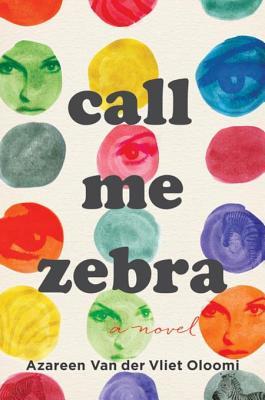
Call Me Zebra
فرمت کتاب
ebook
تاریخ انتشار
2018
نویسنده
Azareen Van der Vliet Oloomiناشر
HMH Booksشابک
9780544944152
کتاب های مرتبط
- اطلاعات
- نقد و بررسی
- دیدگاه کاربران
نقد و بررسی

Starred review from November 20, 2017
In Oloomi’s rich and delightful novel (after Fra Keeler), 22-year-old Zebra is the last in a long line of “Autodidacts, Anarchists, Atheists” exiled from early ’90s Iran. Years after her family’s harrowing escape, alone in New York after the death of her father (her mother died in their flight to the Kurdish border), Zebra decides to revisit some of the places where she has lived in an effort to both retrace her family’s dislocation and to compose a grand manifesto on the meaning of literature. Like Don Quixote, one of her favorite characters, Zebra’s perception of the world (and herself) is not as it appears to others, and her narration crackles throughout with wit and absurdity. As she treks across Catalonian Spain, she journeys through books and love affairs and philosophical tousles with Ludo Bembo, her also-displaced Italian foil. Their pattern of romantic coupling and intellectual uncoupling repeats itself; more interesting are Zebra’s other exploits—her strange and brilliant interpretations of art, her belief that her mother’s soul has been reincarnated inside a cockatoo, and the field-trip group she takes on pilgrimages to famous sites of exile. This is a sharp and genuinely fun picaresque, employing humor and poignancy side-by-side to tell an original and memorable story.

December 1, 2017
Escaping persecution and destruction during the Iran-Iraq War of the 1980s, Zebra's parents flee their home in Iran. Zebra is born while they are en route to Turkey, and her father immediately begins her education by reciting quotations of famous writers and thinkers, instilling in her a love of literature. Her family is one of readers; their family crest is inscribed with three As for autodidacts, atheists, and anarchists. Unfortunately, Zebra becomes an orphan at a relatively early age, and she begins a quixotic search for the meaning of life. Arriving in Barcelona, Spain, she meets Ludovico Bembo, with whom she has a magnetic connection. After a brief time of living together, he declares his love for her, but Zebra is unable to reciprocate. As she walks around Barcelona, whose art and architecture have special meaning for her, she soon realizes that the greatest revenge in life is to feel tremendous love and to persist and prevail. VERDICT This fierce meditation on life and love, a tour de force by self-proclaimed literary terrorist Oloomi (Fra Keeler), is one that many will read and reread.--Lisa Rohrbaugh, Leetonia Community P.L., OH
Copyright 2017 Library Journal, LLC Used with permission.

Starred review from December 15, 2017
A young woman struggles to make sense of the tragedy of exile, embarking on a series of pilgrimages that may destroy her chance for happiness.Bibi Abbas Abbas Hosseini, the thorny, tragicomic heroine of Van der Vliet Oloomi's (Fra Keeler, 2012, etc.) darkly funny novel, is a narrator who deliberately resists categorization. Raised in Iran during the height of the Iraq War, Bibi fled with her parents, the last survivors of a proud tribe of "Autodidacts, Anarchists, Atheists." Their journey was filled with horrors--death, fatigue, and hunger--and it haunts her into a fractured adulthood in New York City. Now, more than a decade after fleeing Iran, with her parents both dead, Bibi seeks a new mentor, vocation, and identity. The Zebra, she muses, is "an animal striped black-and-white like a prisoner of war; an animal that rejects all binaries, that represents ink on paper"; it's a name fit for an outsider, and she takes it on. In order to honor her ancestors, Zebra decides to make a "Grand Tour of Exile" through the Old World. She returns to Barcelona, her family's last stop before arriving in the U.S., to confront the intellectual, spiritual, and moral residues of colonialism and capitalism. There she meets Ludo Bembo, an Italian philologist who both repels and intrigues her. Their love affair is tempestuous, ultimately forcing Zebra to confront the way she uses literature to both separate and connect herself to the world and to others. "I am unafraid to admit that the world we live in is violent, obtuse; that a gulf, once opened, is not easily sealed; that one does not drink from the water of death and go on living disaffected, untouched," she thinks near the end of her journey. In knotty prose, Van der Vliet Oloomi both satirizes and embraces a young intellectual's self-absorbed love for her philosophical forbears. The novel is a bombastic homage to the metacriticism of Borges, the Romantic absurdity of Cervantes, and the punk-rock autofictions of Kathy Acker--all figures who loom large in Zebra's mind. As such, it's not easy to pin down the narrative itself, which is less interested in plot than in how Zebra's interior landscape might be projected onto the world. (At times of great sadness and confusion, the storm clouds quite literally roll in.) Perhaps most astonishing is that we get to revel in the intellectual formation--and emotional awakening--of a frustrating, complicated, hilarious, and, at times, deliberately annoying heroine whose very capriciousness would prevent her from surfacing in any other novel or under any other writer's care.This is a brilliant, demented, and bizarro book that demands and rewards all the attention a reader might dare to give it.
COPYRIGHT(2017) Kirkus Reviews, ALL RIGHTS RESERVED.

























دیدگاه کاربران